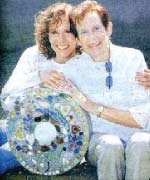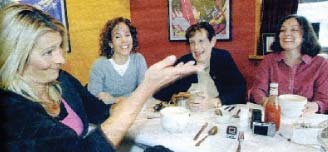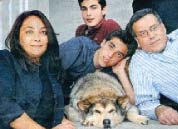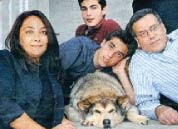“You want to coffee?”
by Ellen Yan, Newsday, May 12, 2007
 When Jayne Dalis fell sick, friends came together to create a safe harbor. They still turn to each other for support and laughter.
When Jayne Dalis fell sick, friends came together to create a safe harbor. They still turn to each other for support and laughter.
In the corner of a Sea Cliff coffeehouse, peals of laughter and streams of all-at-once conversations emanated from a table of women at their weekly jive and java.
One daubed latte onto her face: “Got milk?”
Another perused her friend’s photo, “You look radiant!”
Should there be the slightest hint of self-deprecation, the women gang up with flying compliments. It’s no use ducking modestly because another good thought will shoot along before a free-for-all mutual admiration is spiked with the likes of “You got the therapist gene” and “You’re my emotional vitamin” until the arrival of a yogurt parfait order sparks free-association thoughts that lead to the memory of being kicked out at Vegas’ Hungry Heifer for eating too much.
As one of the women said, they are so not the Desperate Housewives.
A natural support group
 This is the story of the Coffee Girls, for that is what they’ve called themselves over the years. In a world of artificially created support groups, these 40-something women coalesced naturally, like a drop of water here and there, when a friend fell sick. In their self-made safe harbor, they stretched the definition of mothering and learned to celebrate what was already good in their own kids. They came from backgrounds as disparate as boxing promoter and law librarian, but when they met as Coffee Girls, they caffeinated each other’s careers and sipped lessons from their generation: friends’ divorces, parenting of parents and the search for personal meaning.
This is the story of the Coffee Girls, for that is what they’ve called themselves over the years. In a world of artificially created support groups, these 40-something women coalesced naturally, like a drop of water here and there, when a friend fell sick. In their self-made safe harbor, they stretched the definition of mothering and learned to celebrate what was already good in their own kids. They came from backgrounds as disparate as boxing promoter and law librarian, but when they met as Coffee Girls, they caffeinated each other’s careers and sipped lessons from their generation: friends’ divorces, parenting of parents and the search for personal meaning.
“They’re always very encouraging and holding your hand and patting you on the back and wiping your runny nose,” said Coffee Girl Laurette Gnaegy Kovary, 48, of East Norwich, who launched her Bayville art studio two years ago after the java drinkers spooned confidence into her.
“We are at that time when things are transitional, and we need the connection. We need to remember where we came from or where we started.”
It was Jayne Dalis, a Glen Head mom, who really caused the start of the Coffee Girls’ weekly ritual.
She wasn’t the average personal and dog trainer. She was someone who followed New Age credos. She believed a sort of cosmic string tied everything together and that there were no coincidences. Her favorite tapes were teachings channeled by a group of spiritual beings known together as Abraham, who taught that positive vibes attract positive events.
She seemed to be a Dr. Dolittle. Once, when she was a Belmont racetrack horse walker, her shout of “Mellie, you put your hooves back in the water right now” was followed by splash, splash.
When she found a penny, she’d give it a loud “mwaaaah” kiss and say “pennies from heaven.”
What the Coffee Girls admired most was Dalis’ nonjudgmental, live-full spirit.
They believed she could tap into people’s souls and see what they could do best, just like a mother.
“It was something about her that made you want to sit up straight and be the best person you could be,” said Joan Adler, 47, a lawyer and Coffee Girl from Roslyn. “Dogs sat up straight.”
The prognosis isn’t good
Then in 2000, doctors discovered a fast-growing tumor in Dalis’ brain. It looked like an octopus with tentacles, and it was called a glioblastoma. Doctors gave her three months.
The Coffee Girls revved up as radiation moms.
“We used to fight over the week, because we all wanted to take her all the time,” said Joanne Cohen, 49, a former Estēe Lauder executive from Locust Valley. “We worked it out so that everybody got a turn. When she became too sick to go out, we started going to her house and bringing a box of joe, bagels, whatever.”
Before, the friends met for coffee by twos and threes now and then. But with their friend in jeopardy, as many as 10 of them adopted a new regimen of getting health updates on Fridays from Dalis – who was divorced and had a young daughter – at her house or the Sea Cliff Coffee Co.
Even renovations and construction at the coffeehouse did not deter the women.
Coffee turned into a verb, as in “You want to coffee?” and everyone knew what it meant. Not just the act of drinking, but of laughing over funny experiences, talking about current events and laying out mommy concerns.
“I always feel better after ‘coffee’ – stronger, more grounded, a bit more focused, certainly more positive,” Adler said.
There was a line between whining and asking for feedback. “We talk about stuff that really makes us feel good, unless we really don’t feel good,” Kovary said. “You’re going for positive reinforcement, not to expel bad energy.”
These suburban moms, most of them with 2.0 children, passed on to each other their experiences of child-rearing, teen dating, schools holding charity fundraisers and more.
In the Coffee Girls’ behavior and accomplishment, Rebecca Katz-White, 41, found something worthy of passing on to her son, 13, and daughter, 10, especially when they have questions about their friends’ actions.
“I hope that they would see that there are lots of different women who do different kinds of things, especially for my daughter,” said the Roslyn Heights Coffee Girl, who just began working for a toy distributor.
Making time count
The trite saying that time is short – the Coffee Girls knew it to be true. That glioblastoma changed their lives like nothing had before.
Coffee Girl Cindie Leigh said it was the wake-up call for her husband, Steve, to switch his travel-away job for a local one. The couple dropped plans for a McMansion. They moved to a better school district instead of sending their children to private schools.
“There was really a feeling that there was exactly enough time for the important things in life and no time for anything else,” said the Glen Head resident, 45, who last month left her job as a Hofstra University law librarian for an eBay selling career to have more family time.
The Coffee Girls mothered each other’s causes, from Planned Parenthood action breakfasts to donations to Habitat for Humanity.
Even going to boxing matches at Madison Square Garden and watching punches on television didn’t seem strange to the Coffee Girls. After all, Coffee Girl and boxing promoter Cindy Rubin’s bonuses depended on her boxers winning.
“Some of them were like, their husbands fell asleep and ‘We’re still watching,'” said Rubin, 43, of Glen Cove.
When her husband’s best friend was dying, Rubin felt comfortable enough to ask the Coffee Girls if she was wrong to avoid visiting a man who had wasted away from 225 pounds to 120.
They told her she had to go. “They made me stronger,” Rubin said. “We’re brutally honest with each other. That’s why it’s so good.”
Perhaps there really were no coincidences, and the Coffee Girls were meant to steer each other onto the right path.
A plan to win the fight
 They took care of Dalis, who was looking for her own path to beat the tumor. She always thought she’d win and when she found Dr. Henry Friedman, deputy director of Duke University’s brain tumor center, she returned to Long Island triumphant after getting into cutting-edge medical trials.
They took care of Dalis, who was looking for her own path to beat the tumor. She always thought she’d win and when she found Dr. Henry Friedman, deputy director of Duke University’s brain tumor center, she returned to Long Island triumphant after getting into cutting-edge medical trials.
“I have a man with a plan,” she crowed.
In her note of inspiration to the Guardian Brain Foundation, a Dix Hills nonprofit created by Coffee Girl Mary Pallotta, whose brother died of the same kind of tumor, Dalis wrote, “A year went by, then two, then three… it turned out that I am the fortunate survivor.”
She was in remission for two years. Then it was back. Right before another radiation treatment, in one of the few times she showed her anger, Dalis hurled her radiation mask down in the hospital hallway and stomped on it.
By the spring of 2004, her mom, Judy Shapiro of Great Neck, had moved into Dalis’ home to take care of her. Pallotta wrote to the “While You Were Out” home improvement show, and the gang surprised Dalis with a renovated patio-garden, where she liked to reflect.
Dalis couldn’t win against the tumor. And then she seemed to want to let go.
“I feel like I can’t fight anymore,” Pallotta remembered Dalis saying in one phone call.
Toward the end, Dalis was in bed with eyes closed, but Adler knew from her mother’s last days that hearing is one of the last senses to go. So the Coffee Girls gabbed as usual. Their friend smiled and laughed with eyes closed.
She died at home on April 24, 2005. She was 49.
Shapiro invited the Coffee Girls to take something of her daughter’s. Kovary accepted the dining table, where the Girls had drunk coffee, and now uses it to do her artwork. Leigh took Dalis’ dog, Lola.
Later, they felt at times that Dalis was still around.
When her parents and brother went to pick out her casket, they all felt drawn to one. The caskets had names and the one they picked was called Abraham.
Pennies from heaven
Then when they returned home that day, there was a penny just inside the front door. When Pallotta moved into her Dix Hills home, a penny sat on the windowsill of the office for her Guardian Brain work. Rubin, who used to put lipstick on Dalis during Coffee Girl visits, found a penny in her makeup case.
“Every time we found a penny, we said, ‘Jayne’s here,'” Shapiro said.
Recently, when Pallotta and the Shapiros went out for dinner, the wine’s name was Duke and the waiter was Henry, bringing to mind Jayne’s doctor. It was a laugh.
After Dalis died, the Coffee Girls had a sort of crisis of being. They were weary from five years of seeing a peer die, the first time for most of them.
Celebrating life
 “We were really scared,” Rubin recalled. “Once we didn’t have Jayne, would we continue? We discussed it at length. Were we strong enough without her? And everyone’s lives all became so busy; it’s hard sometimes just to take those few hours out.
“We were really scared,” Rubin recalled. “Once we didn’t have Jayne, would we continue? We discussed it at length. Were we strong enough without her? And everyone’s lives all became so busy; it’s hard sometimes just to take those few hours out.
“We have so much more to offer each other. We decided after mourning that we needed to celebrate life, and we needed to do positive fun things together as a group.”
They’ve gone to concerts at the Planting Fields Arboretum in Oyster Bay and coffeed at the beach in front of Kovary’s Bayville art studio. They’ve supported the Butterfly Ball, which raises at least $10,000 annually for the Guardian Brain Foundation.
Some of the Coffee Girls have moved off Long Island, and seven women now remain as the core. They bring food and keep in touch with Dalis’ parents. Especially close are Adler, who lost her mom just before Dalis died, and Shapiro, who found a sort of daughter in her.
In the past few years, a few of the Coffee Girls’ parents or in-laws have passed away. More and more, they’re facing what it’s like to be the sandwich generation, including how they might care for distant parents if needs arise.
“My mom, I take her to her doctor’s appointment,” said Pallotta, 46, mother of two. “I’m always telling her to button up and put your hat and gloves on… to drink chamomile tea to help her sleep at night.”
When Leigh’s father was comatose from a stroke, she was forever grateful to Adler and her note about the hearing. “I was able to tell everything I wanted to my father,” Leigh said.
The Coffee Girls meet now on most Thursdays. They want to write a book, perhaps a chapter each, about Dalis. It might be called Coffee With Jayne.
Some outsiders have been jealous of their friendship, the Coffee Girls said, and their husbands want to know “Do you talk about us?”
“People think… it’s like intriguing,” Rubin said. “There’s been lots of coffee groups, but not one that’s lasted as long as us. We’re good to the last drop.”
